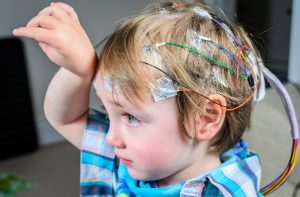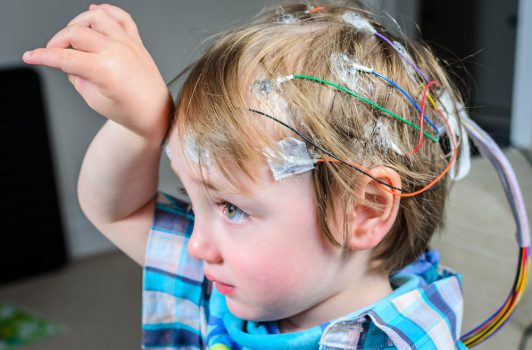What is epilepsy?
Epilepsy is a chronic condition. It is a group of neurological disorder which is characterized by recurrent unprovoked seizures. Epilepsy affects the central nervous system. It makes the brain function abnormally leading to seizures and loss of consciousness.
Epilepsy can affect anyone, but it more commonly affects small children. It affects 65 million people around the world.

What are the causes of epilepsy?
Half of the people who develop epilepsy do not have a definite cause. But in half of the cases of epilepsy, the condition may be linked to the following factors:
- Genetic factors: Sometimes epilepsy is related to genetic factor because members of the same family experience similar type of seizure and the same part of their brain is affected.
- Head Injury: Sometimes people develop epilepsy after a head injury due to a fall or accident.
- Brain injury caused before birth: The fetus is very sensitive. Sometimes due to an injury or infection in the mother or due to a scarcity of oxygen or inadequate nutrition, there are chances of brain damage to the developing fetus. It may lead to epilepsy.
- Disease: A person can develop epilepsy after having a severe disease like meningitis or Viral encephalitis.
- Brain Disease: Brain disease like a brain tumor or stroke can be a cause of epilepsy as these diseases injure the brain.
- Age-related diseases: Epilepsy can also be caused by age-related problems like dementia and Alzheimer’s.
What are the symptoms of Epilepsy?
The primary symptom of epilepsy is seizures which are caused by abnormal activity in the brain. But different people experience a different kind of symptoms when they have a seizure. The patient with epilepsy may experience the following symptoms while having seizures:
- Loss of consciousness
- Movement of the hand and leg which cannot be controlled.
- Some people may keep staring without uttering a word.
- Patients can be confused
- They may feel scared or anxious.
What are the different kinds of seizures experienced by patients with epilepsy?
Doctors classify seizures into the following types:
Focal seizures
When there is abnormal activity in one part of the brain, it causes partial seizures or focal seizures. There are two types of seizures caused by focal seizures.
- Focal seizures without losing consciousness: These seizures are simple. People don’t lose consciousness, but they may experience changing emotions. These kinds of seizures may make the people perceive things differently, feel lightheaded and expertise involuntary shaking of body parts
- Focal seizures with the loss of consciousness: These type of seizures are complex. People lose their consciousness and their ability to think. They may repeat the same actions again and again and may stare into space continuously.

Generalised Seizures
These kinds of seizures affect all the areas of the brain. It causes six different types of seizures like:
- Absence seizures: It affects children. It may cause staring into space blankly, smacking lips and blinking continuously. It may also result in loss of consciousness.
- Tonic seizures: It causes stiffening of muscles.
- Atonic seizures: This type of seizure takes away the ability to control muscles.
- Clonic seizures: These kinds of seizures lead to sudden jerking of muscles of arms, neck, and face.
- Myoclonus seizures: People experience brief twitching of the arms and legs.
- Tonic-clonic seizures: This kind of seizures are very severe. People not only faint but they may also lose their bladder control, experience stiffness in the muscles and they may also bite their tongue.
What triggers seizures?
Some people can recognize situations that trigger seizures. The most usually stated triggers are lack of sleep, fever or illness, hunger, bright lights, certain medicines, alcohol, and drugs.
What are the treatments available for epilepsy?
According to Dr. Beth Latimer, a Washington DC Children Neurologist, it is essential to review medical history and do a proper neurological evaluation before starting the treatment for epilepsy. The patient’s health and type of epilepsy should also be considered. The following procedures can be given to the patient:
Related Article: PANS and PANDAS: Is your child a victim?
- Medications: The doctor can prescribe antiepileptic drugs to control the number of seizures. These medicines have to be taken correctly according to the doctor’s direction. These drugs are so beneficial for some patients that they stop seizures completely.
- Special diet: Many people benefit by taking ketogenic diet which encourages the intake of more amount of fat and less amount of carbohydrates.
- Surgery: Epilepsy is caused by abnormal activity in the brain. Sometimes the doctors prescribe removing or altering the part of the brain responsible for seizures with the help of surgery.
- Vagus nerve stimulator: This is a device that is surgically implanted beneath the skin of the chest. It stimulates the nerve in the neck to control seizures.
With proper medical attention and care, many patients start living a healthy life and stop experiencing seizures.
References:
- https://en.m.wikipedia.org/wiki/Epilepsy
- https://www.epilepsy.com/learn/about-epilepsy-basics/what-epilepsy
- http://www.bethlatimermd.com/our-services/epilepsy-2/

